Last month, I was on a small boat off the southern coast of the Fijian island of Viti Levu, considering a cast of characters I had met for the first time only a few minutes earlier. Although I wasn’t entirely sure about the boat’s captain, the other half-dozen passengers were definitely surfers. Just moments earlier, I had watched them each carefully load a short surfboard onto the boat before settling into a seat along the little vessel’s railing.
As we hurried east into a stiff breeze — heading for a nearby surf break along Viti Levu’s outer reef — the boat bobbed rhythmically over the warm, blue waters of the Pacific. And while none of the other passengers looked the slightest bit worried about what was waiting for us beyond that reef, my stomach was full of butterflies.
Waves of a Lifetime
Adventure is one of those words with a definition that typically depends on who’s doing the talking. For me, paddling out on a borrowed board to ride waves at a South Pacific surf break I’ve never seen before certainly qualifies as intensely thrilling. It’s also a brand of adventure for which I’ve happily flown thousands of miles around the world and paid good money to enjoy.
Boris Kaz, the owner of surf and dive property Waidroka Bay Resort on Viti Levu’s southern coast, caters specifically to travelers who are hoping to enjoy the thrill of an ocean adventure while on vacation.
“When you come to Fiji, you’re amazed by the power of the waves,” Kaz told me during my stay at his 12-guestroom property. “The power of the groundswell of the Pacific — and then the reefs that are underneath — jack these waves up and make them faster, stronger and barreling, and that’s what attracts most of the surfers.”
A longtime surfer and diver, Kaz believes Fiji has undoubtedly supplied the best waves of his life, but he notes that he and his Waidroka Bay staff also find tremendous satisfaction in helping guests enjoy their own sensational ride over one of Viti Levu’s reef breaks.
“The biggest thrill for us is to see people catch some good waves,” Kaz said. “There were guests here yesterday who told me, ‘I caught the best two waves of my life.’ The passion we have for all this ourselves is also a passion for helping other people experience it, enjoy it, try it and succeed. That’s where we come out and we say, ‘Man, we’ve done our job. This is amazing. These people had a great time.’”
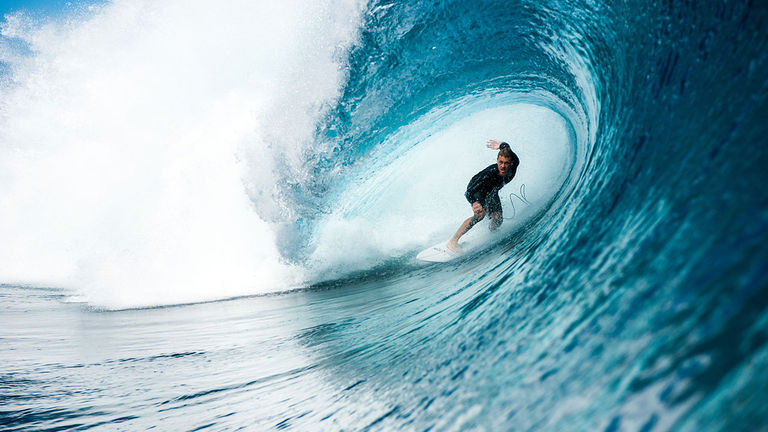 Clients can head to Fiji for surfing adventures.
Clients can head to Fiji for surfing adventures.
Credit: 2024 Tourism FijiWhat Defines Adventure?
Earlier this spring, Shannon Stowell, CEO of the Adventure Travel Trade Association (ATTA), told me that his organization surveyed a sizable group of consumers several years ago, hoping to better understand how people define adventure.
“If you’ve got 100 people in a room, there are probably 100 definitions of adventure travel,” Stowell said. “But there were three themes that seemed to be predominant in what everyone considered adventure travel, and that was some sort of immersion in a local culture, getting into nature and some sort of physical activity.”
Whether they were a young, strapping person or an older adventure traveler, everyone came back to the table with these three patterns, Stowell said, noting that in a subsequent consumer study, the ATTA learned that one of the main motivators for adventure travel is that people want to be challenged.
“But again, there’s a whole range,” Stowell said of the study’s results. “One person might view trying new foods in another country as a challenge. Another person is going to view climbing Denali as a challenge. So, people want to be pushed, but that’s probably where it really gets subtle — how much does this person want to be challenged on this trip?”
If you’ve got 100 people in a room, there are probably 100 definitions of adventure travel.
Historic Highs
Gregory Claxton, the CEO of Sarasota, Florida-based tour operator Incredible Adventures, jumped out of a perfectly good airplane for the first time nearly four years ago in Egypt.
“And I was scared to death to do it,” Claxton told me with a laugh.
Incredible Adventures got started in 1993, offering clients the chance to fly MiG-29 fighter jets in Russia, according to Claxton, who has been with the tour operator since 1996.
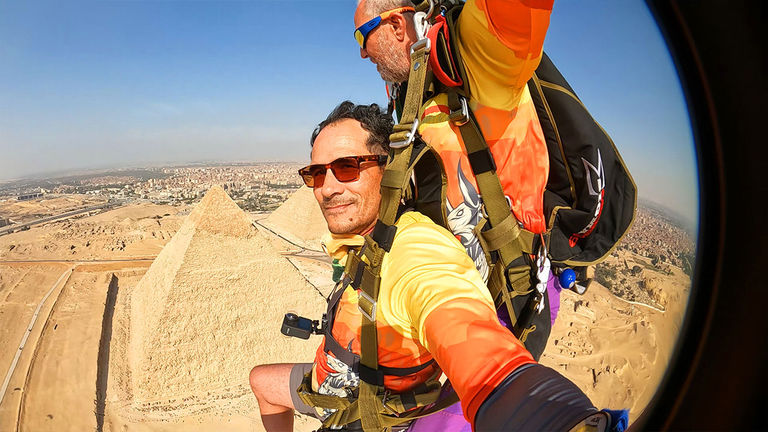 Advisors should qualify clients, taking comfort levels into account.
Advisors should qualify clients, taking comfort levels into account.
Credit: 2024 Incredible AdventuresToday, travel advisors can book a wide range of customizable and commissionable extreme adventures with the company, including skydiving over Antarctica, Mt. Everest and the pyramids of Giza.
“One of the cool things about the company is you don’t have to be a skydiver to skydive,” Claxton said, explaining that clients can participate in tandem jumps with professionals on skydive products.
Claxton has sold skydiving packages to travelers for decades, but he says the idea of jumping out of a plane himself was just too frightening until the launch of his company’s Jump of the Pharaohs product about four years ago, which helped him muster the courage.
“There are just no encumbrances, no hindrances — nothing matters at that point,” Claxton said of his first freefall.
“Your mind is clear, and you’re just taking in the view, thinking, ‘Wow, how amazing is this?’”
Those who skydive over the Giza pyramids with Incredible Adventures are treated to an especially rare perspective, Claxton adds.
“Once you pop your chute, you’re flying around like a little airplane, and we circle around the top of the pyramid,” he said. “We come within 50 feet or less of the top. Next thing you know, you’re thinking, ‘Wow, I feel like I can touch the pyramids!’”
On Top of Africa
Speaking of challenging yourself for a singular reward, Massimo Prioreschi, president and CEO of adventure tour operator MT Sobek, hopes to climb Kilimanjaro for his 60th birthday next year.
“What do you do when you turn 60?” Prioreschi said. “Some people rent a villa; some people have a big party. I’m like, ‘Hey, why don’t we just all summit Kili?’”
Prioreschi has been to the 19,341-footsummit of Africa’s tallest mountain before.
“Seeing the sunrise while you’re on the summit is pretty spectacular,” he recalled, noting that he made his first climb in his 30s.
“It was one of the most rewarding treks I’ve done, but it was also really difficult for me.”
MT Sobek offers commissionable products that guide clients to the top of Kilimanjaro, featuring porters and guides who carry gear and handle meal prep. Still, Prioreschi says the expedition is one most clients will need to train for.
“There’s no technical climbing, there’s no scrambling, there are no ice axes — there’s nothing like that — you’re just hiking up the mountain,” Prioreschi said. “But can you hike six or seven hours a day? And can you do that eight days in a row without feeling destroyed?”
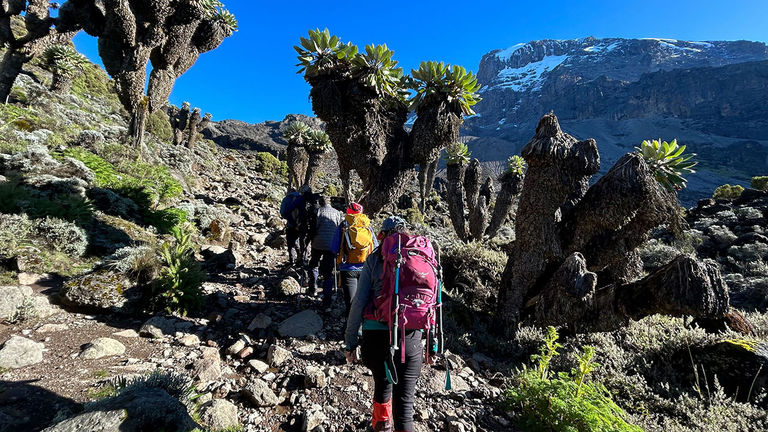 MT Sobek offers climbs of Mt. Kilimanjaro.
MT Sobek offers climbs of Mt. Kilimanjaro.
Credit: 2024 Neil Atkinson/MT SobekWhile MT Sobek has a range of commissionable treks to some of the world’s most stunning alpine destinations — including an excursion guiding travelers to Mt. Everest’s 18,500-foot base camp — Prioreschi says the tour operator typically encourages a three-way call early in the planning process between travel advisors, their clients and an MT Sobek representative to help qualify people.
“Our goal is to match the guest to the right trip,” Prioreschi said. “The last thing we want is to get a guest on a trip that’s too difficult.”
It’s a vacation, after all, he says — clients should be enjoying themselves.
Selling Adventure
Stowell of the ATTA also encourages advisors working with adventure clients to speak first with them about the types of experiences they have previously engaged in. He suggests querying clients about their physical activity levels and discussing how much time they want to spend in nature.
And advisors should ask the client if they are an active runner, biker, climber, skier or hiker, Stowell recommends.
“Is this somebody who wants to sit on an expedition cruise ship and look at the polar bears, or is this somebody who wants to walk with the game ranger in Zimbabwe?” he said.
And when qualifying an adventure tour operator, advisors should be asking frank questions about risk management and safety plans, Stowell says, as well as inquiring about how the company has handled past accidents.
Have there been fatalities? And what is the business’ commitment to working with locals?
“If the operator is running remote hiking trips in the desert in the Middle East and seems confused by the concept of a safety plan and a risk management plan, I would be very concerned,” Stowell said.
Our goal is to match the guest with the right trip. The last thing we want is to get a guest on a trip that is too difficult.
Sharks Uncaged
Marjanna Akhtar, owner of Great Expeditions Travel in Paonia, Colorado, has an attention-grabbing description for the 10- to 12-foot bull sharks she’s been scuba diving with in Fiji.
“They’re massive,” Akhtar told me with a chuckle.
An avid diver for decades, Akhtar has done the extremely popular Beqa Lagoon shark dive off Viti Levu’s southern coast several times, and, clearly, she’s a big fan.
“It’s phenomenal,” Akhtar said. “There are so many bull sharks that come in. And it’s definitely an adrenaline kick.”
A completely cage-free experience, the highly popular dive takes place just a short boat ride from Pacific Harbour on Viti Levu.
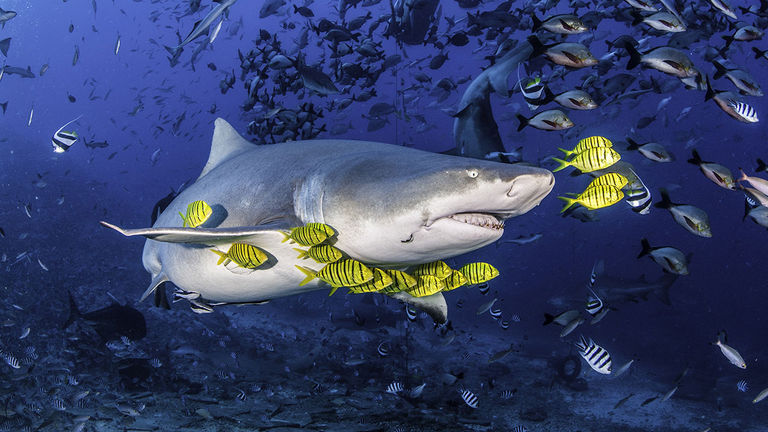 Great Expeditions Travel markets cage-free shark experiences for divers.
Great Expeditions Travel markets cage-free shark experiences for divers.
Credit: 2024 Waidroka Bay ResortThe dive’s operators feed the sharks to attract the ocean predators, and scuba divers typically see everything from nurse and lemon sharks to white tip, black tip and silver tip sharks, along with all kinds of bull sharks and — if divers are lucky — tiger sharks.
Roughly 30% of Akhtar’s business involves vacation planning for scuba divers, and she says Fiji is on most of her clients’ bucket lists, thanks to the destination’s extraordinary collection of remarkably healthy reef ecosystems.
When booking Fiji, Akhtar often suggests divers stay at Waidroka Bay Resort, which offers commissionable dive packages featuring the nearby Beqa Lagoon shark experience.
“You will never get into a place where you dive with so many bull sharks,” said Kaz of Waidroka Bay. “There are always at least 20 bull sharks down there. And if a tiger shark rolls in, all the other sharks typically move away. A big tiger shark can be around 14 feet.”
Watch This Space
Advisors working with affluent adventure clients who are keen to experience something entirely new may want to look into Space Perspective, a Florida-based space balloon expedition hoping to lift off for the first time in 2025.
“We hope we can take as many people as possible to experience what’s called the ‘overview effect,’” said Edyta Teper, vice president of global sales and trade partnerships for the company. “What that means is when astronauts go to space, and they see our planet from that vantage point, they gain a new understanding of the world and our place within it. They tell us it’s an incredibly compelling, transformative, beautiful experience.”
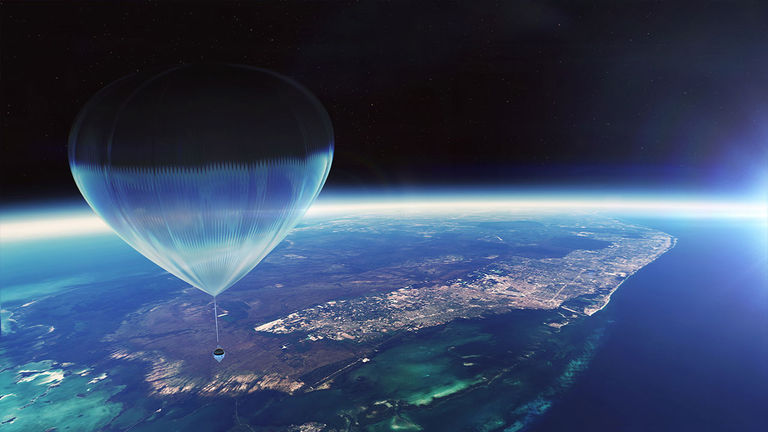 Space Perspective’s first launch is set for 2025.
Space Perspective’s first launch is set for 2025.
Credit: 2024 Space PerspectiveEmploying a pressurized capsule called Spaceship Neptune, which has been engineered to comfortably accommodate eight passengers and a captain, Space Perspective has been developed using 50 years of NASA space balloon technology, according to Teper. Over the course of six hours, it’s designed to leisurely lift travelers to an altitude of 100,000 feet, where they’ll spend time above 99% of the Earth’s atmosphere, then gently descend and splash down in the ocean, where a ship will bring them back to land.
“If you can board an airplane, you can board Spaceship Neptune,” Teper said. “It’s not a rocket; it’s a 12-mile-an-hour journey, so think of it like riding a bicycle — that’s the speed. And our explorers will not experience G-forces. We do not require special training.”
Space Perspective is planning an unmanned test flight later this year and has already reserved more than 1,700 tickets for flights scheduled over the next several years, applying a reservation model based on fully refundable deposits. Teper says the commissionable, per person price is $125,000, and travel advisors have been responsible for roughly 45% of Space Perspectives’ advance sales.
Daniela Harrison at Avenues of the World Travel in Flagstaff, Arizona, says her agency has reserved a Space Perspective capsule in 2028 (she has sold four seats).
“I think it’s going to be a game-changer in the space market,” Harrison said, noting that other rocket-based, zero-G products can be six times more costly. “Comparing that with Space Perspective, and traveling at 12 mph with Wi-Fi, a bar and food — that sounds amazing!”